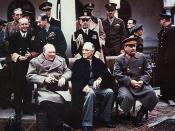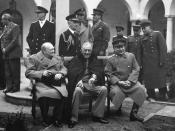The Yalta Conference* has been discussed, debated, argued and written about more then any other topic of WWII with the possible exception of the dropping of the atomic bomb on Japan. The passions run so high regarding this topic that the participants in the debate of Yalta seem to have gravitated into two categories; there are those who support and accept it and those who reject it. There seems to be no middle ground. The deep division is apparent not only among commentators, writers and pundits but also among historians.1 The argument has basically boiled down to between "neoconservatives" and "liberal internationalists". The conservatives accuse President Roosevelt's "unwavering faith in the Soviet Union and Stalin" that led the President to be "soft" with Stalin at the conference and allowed Eastern European nations to become the satellites of the Soviet Union. The liberal interpretation is that the presence of the Red Army in 1945 ultimately determined the fate of Eastern Europe and that the President did the best he could under the circumstances.
A closer look at history leads to a different conclusion.2 The debate began immediately after Roosevelt returned from Yalta but, intensified during the so called McCarthy era when Republicans attacked the Roosevelt administration for "selling out" Eastern Europe to Stalin. In fact, in 1952 the Republican Party platform denounced Yalta and promised that it "will repudiate all commitments contained in secret understandings such as those of Yalta, which aid Communist enslavements".3 The debate surfaced again in the mid - eighties when a movement surfaced to repudiate the Yalta accords by Congress after President Reagan criticized the division of Europe.4 The issue of the Baltic Countries was not a visible issue at Yalta. That is not surprising because the Baltic question had been "settled" by Roosevelt at the Tehran...


